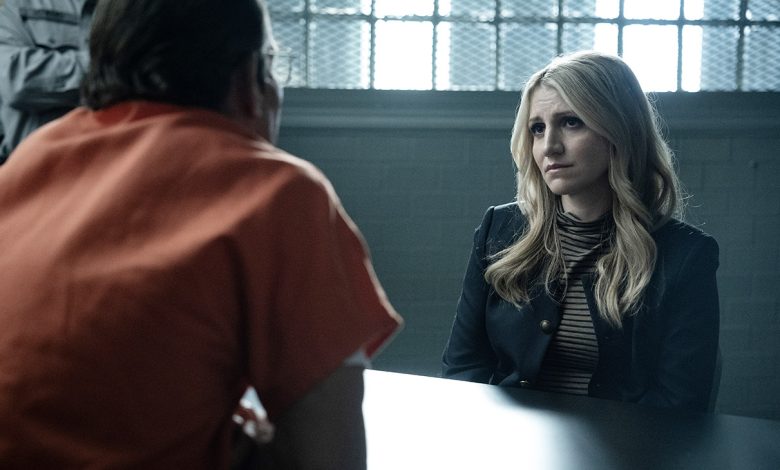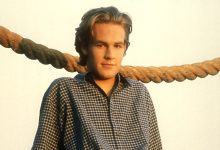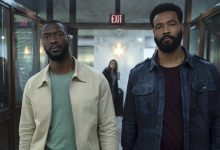‘Happy Face’ Producers on Crafting a Mostly Murder-Free Serial Killer Drama

In Paramount+‘s Happy Face, all the murder happens in the past and off camera, but that doesn’t mean the people behind it aren’t trying to unnerve viewers with their relatively novel spin on true crime.
To be sure, it is true. The “Happy Face Killer” is real. Keith Hunter Jesperson (played by Dennis Quaid) is serving a life sentence for the murders of eight women and has confessed to the killing of many, many more. He also has a daughter, Melissa Moore (Annaleigh Ashford), whose devoted her life to working with the families of victims. But that, in many ways, is where the similarities between truth and TV began to part ways. The dramatization, which launched on March 20, leans as far away from serial killer tropes as possible, nixing reenactments of crimes and displays of violence for tense exchanges between a convict and his fraught daughter — introducing a purely fictional central mystery along the way.
اRelated Posts:
Showrunner Jennifer Cacicio, joined by fellow executive producers and TV veterans Michelle and Robert King, recently spoke with The Hollywood Reporter about making Happy Face — including the nearly eight-year road to air, winning the favor of the real-life Melissa and their love of lengthy cold opens.
***
This is hardly a traditional approach to true crime. The killer is already been caught, and the flashbacks avoid the crimes themselves. Was that always the intent?
JENNIFER CACICIO I think I found the podcast when I was working on Your Honor, and I’d gotten to know Robert and Michelle through that show. What’s most interesting about the story is Melissa’s relationship with her dad and this idea of what it means to love a monster. We’ve seen a lot of other serial killer shows before, and this seemed like an opportunity to tackle it through a fresh perspective.
MICHELLE KING Jen never considered anything else. She walked right into knowing that this is the way the story needed to be told.
Were you also considering what place depictions of violence might have on a show like this? Because there are none.
CACICIO We explored it but ultimately decided that it was scarier to not see it. I think we can imagine the worst. To me, the scene in the pilot where Dennis is just talking about how he kills a woman, it’s evocative and unsettling. That he’s saying these things to his daughter is much more unsettling than any flashback of watching him do something. It’s just a bit more specific.
Robert King It also relies more on performance. We’ve all seen what happens in Criminal Minds or whatever when someone’s describing something and then you cut to the action just to kind of provoke. This relies on Dennis.
MICHELLE It also would’ve been a distraction from the theme. This is a story about a woman and her dad. To see an act of violence that didn’t involve the two of them would’ve brought people off the theme.
I understand the motivations for all of this, but were your executives always on board? When you sell a serial killer show, there’s generally the expectation of killing.
CACICIO The show has had many iterations because it’s been in development for a long time. We got the rights in 2018. We sold it in the room, pre-COVID, so we’ve had many executives. [Executive producer] Liz [Glotzer] and I always joked that after we sold it, we were worried they didn’t realize there was not an active serial killer in the serial killer show. But it was always my intention to keep the show suspenseful — and to stay true to Melissa’s emotional story. I didn’t want a body to drop every week without losing the cliffhangers and twists and mystery that the viewer cares about. But it’s so much heavy material here. Robert, what did you say? “Some shows are vegetables and some shows are dessert?” I wanted this show to be dessert… even though it’s about family trauma.
ROBERT KING A lot of modern shows raise your blood pressure because you’re afraid they’re going to show something grizzly. Then there’s the cringing. That’s what violence creates, and I don’t even know if that’s suspense… “I don’t want to watch more, but I’ll watch more.” The key to Hitchcock suspense is not about the blood. It’s, “Uh oh. What is going to happen next?”
Can you tell me about that shift in mandate, at least as it pertains to your own work?
CACICIO If I remember correctly, the first iteration was a little bit more of a slow burn crime drama. They wanted something a bit more propulsive — hitting the thriller moments a little harder, making sure we had that a binge quality to the episodes. I always thought of it as a family drama that turned into something a bit more thriller-y by the end of the season. They wanted more of that energy in the beginning.
MICHELLE Talking about the challenges of getting it to the air, the preliminary challenge was just getting the rights to Melissa’s story — having her trust us. That was all because of Jen and how she her story with Melissa, because there were other people bidding for this.
CACICIO The first time I listened to the podcast, I really connected to it. My dad was in prison for most of my childhood for drug-related crimes. Melissa and I were the same age, we’re both the oldest of three kids. We had these close connections to our dads who had a secret lives.
The show deviates from the real Melissa and Keith and goes into entirely fictional territory, introducing another possible victim. Why not just adapt the real story?
CACICIO I always knew I wanted to fictionalize the story. The podcast itself is very emotional in terms of coming to terms with who her father is, and also sitting down with the family members of her father’s victims. It’s harrowing, but it’s not really a TV show. I didn’t really trust myself to stay journalistically true to her story. But in wanting a serial killer show, I knew that I needed an engine. The podcast didn’t have that. I told her the story of her family, her father’s victims’ families, but I wanted this other story that would underpin all of that. She liked the idea. Also, she had the podcast, she wrote a memoir, she’s gone on talk shows. She’s told her own story, her own way. So a lot is different, but nothing outside the realm of possibility. The main engine of the show is Keith confesses to this ninth murder, and Keith has confessed to other murders. Some have panned out, some haven’t. So I took this thing that’s happened and created a fiction version.
In taking real events and real names, and attributing fictional elements of this possible ninth murder to Keith, did you encounter any legal hurdles? Can convicted serial killers be defamed?
CACICIO No, we checked. Keith has no libel protections. He’s already defamed himself. And then we did change the names of his real eight victims.
Jen, you’ve worked with Michelle and Robert before. Did they indoctrinate you in the school of the incredibly long cold open?
ROBERT I love that it’s ours! (Laughs) I’m so proud because I’ve been seeing much longer cold opens on other shows, and it was like, “Oh, how sweet.”
It is a real signature. If I’m 12 minutes into an episode and I still haven’t seen the opening titles, I assume you both produced it.
ROBERT I don’t think Michelle and I have ever been good at a true cold open, which requires a little bit of a nugget of something — a joke or some stupid bullshit. “Oh, someone sent me flowers!” There’s nothing helpful about that. You can’t get into story. The later the break, the better. Also, it’s just funny. It goes back probably to Monty Python. It’s always funny to me when you forgot and suddenly realize, “Oh, it’s been 20 minutes and we haven’t seen the credits yet.”
CACICIO You kind of trick the viewer into being sucked in. You’re already engrossed If it’s only four or five minutes in, it’s an excuse to change the channel or do something else.
Can you tell me about the conversations the three of you had about how much Dennis to show? The more screen time you give someone, the more room there is for empathy, and he’s playing a complete monster.
ROBERT Silence of the Lambs was a good mold here. When you come down to it, Anthony Hopkins isn’t in that much of Silence of the Lambs. But his presence and the weight of him fills it, and it probably would even be less traumatic were he in it more.
MICHELLE There’s something natural about the way it was told in that it’s all from Melissa’s point of view. Keith is stuck in prison, so you’re only going to get to him when she gets to him. By definition, it’s going to be limited.
CACICIO All of these scripts were written before we cast Dennis. Once we cast him, did I write a few more scenes? Yes. But the character has his fingers in everything, because his presence has touched everyone — even though he’s not on screen nearly as much as Melissa.
I’m under the impression this season ends in an open-ended fashion. Was that always the intent? The original logline made it seem limited.
CACICIO I definitely see multiple seasons. Melissa’s story is still unfolding. Keith is still writing letters. Right now, she’s working with the family of the Long Island Serial Killer. There’s all this craziness around that. She has made subsequent podcasts with Susan Smith. She was the first producer to ever get O.J. Simpson’s kids to go to speak publicly.
Oh, I wasn’t aware of that.
CACICIO In in the end, they opted not to be part of the documentary. But she is the first producer they ever spoke to. But because of everything she’s been through, she just has this way of getting people to trust her and open up to her. She’s just a walking ball of compassion, who’s fallen into this career where she’s around all these kind of crazy true crime stories and helping people navigate them. There are more stories to tell.
***
Happy Face releases new episodes on Paramount+ every Thursday until the May 1 season finale.
Source: Hollywoodreporter





